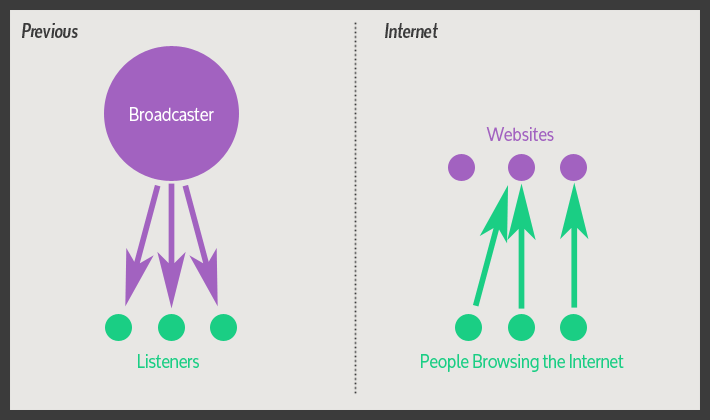There are many reasons for fallacies, many arise from oversimplification and others from urban myths. I have listed the most common and harmful ones.
The key to success is the ability to adapt to the changes that the new media brings. There is not much to gain by either resisting or denying it.
Internet has its own rules and influence. As a result, more and more people are forced to make sense of it. But it doesn't work the other way around.
1. Internet is a controllable push medium
Internet is invented to share information. It is built for putting unstructured data online without restricting the form, purpose and the way of the usage. It is never intended to be used as a mass broadcasting medium where one transmits a message and everybody is obliged to listen.
Because of this design where everybody can freely decide what to present and others are free to take it, the internet is such a great success. A lot of web development projects try to push users to doing things.

The problem is they don't have any users to push and they will also not get any users behaving with misplaced arrogance like that.
Luckily the formula is really simple: just put stuff online that people need or find interesting. That is actually the way you use the internet yourself. There is really no way of forcing or manipulating.
2. Adaptiveness is the issue
Separate devices, systems, platforms, browsers, applications etc. exist for a reason: they are for separate things. It is a lot of times not smart to try to generalise and unify them for one purpose.
Just like shoes: there are sport shoes, work shoes, dance shoes, mens or womens shoes. Nobody tries to create a general shoe for every person and use case. Technically maybe it is possible, but it is not the way people use shoes. It is not really different with computers.
If you need a website for a certain use case on the desktop, it can not automatically converted to a certain mobile device. The screen sizes are different, the input devices are different, the expectations are different. Therefore most of the time it is wiser to just develop these entirely separately.
3. CTRL+C: Copy; CTRL+V: Paste; is easy
A lot of things on the internet is free and open source. You can indeed see with the press of a button the source code of a website. Things like that are not a secret. But it doesn’t mean you can duplicate your favorite application and run away with the money.
The real complexity of these applications are actually not the code. But the know-how to write, maintain and expand the code. Without these abilities the code base or the original idea is nothing more than the manual of a F-16 without fuel.
Copy behavior often leads to cargo cult: Only the external appearance is imitated like the graphical design and the amount of Tweets. While copying the essential things like the amount of hard working people and years of effort are forgotten in ignorance.
Conclusion
In my experience a lot of unrealistic project expectations are caused by this type of misunderstandings. The gap becomes larger because it is seems more and more self-evident that this sort of things are known to everyone.
